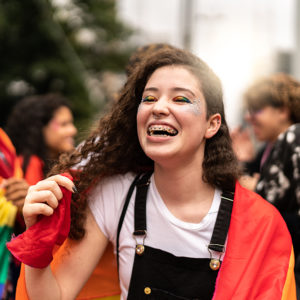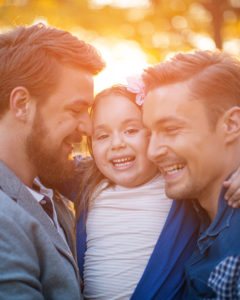I Identify as LGBTQIA+, Can I Be a Foster Parent?

The short answer to the question of “Can members of the LGBTQIA+ community be foster parents?” is most often yes. Specifically at KVC and in Nebraska, the answer is yes.
As of a 2017 Nebraska Supreme Court ruling, same-sex couples are able to become foster parents. This decision overturned a 1995 ban, and was brought about by three same-sex couples, the ACLU of Nebraska, the ACLU LGBT and HIV Project, and the law firm of Sullivan & Cromwell LLP in a 2013 lawsuit.
Help children and teens in your community.
Become a foster parent today!
However, depending on the state and the agency, LGBTQIA+ people and couples may face obstacles as there is no national ruling on this topic. This factsheet from the Department of Health & Human Services’ Child Welfare Information Gateway is a helpful tool that discusses facts and options for LGBTQIA+ single people and couples who want to be foster parents.
LGBTQIA+ youth and foster care
It’s difficult to measure or definitively know how many LGBTQIA+ kids are in the foster care system. Of the approximately 260,000 kids ages 11 and older who are in the foster care system at any given time, it is estimated that between 5% and 10% are LGBTQIA+ youth.
All kids enter the foster care system for abuse, neglect or other serious family challenges. While LGBTQIA+ kids enter the foster care system for reasons other than their identity as LGBTQIA+, it has been shown that LGBTQIA+ youth are overrepresented in foster care because of general family rejection to their gender identity or expression, or their sexual orientation.
Some alarming statistics provide insight into what LGBTQIA+ kids regularly deal with at home and at school:
- over 30% of LGBTQIA+ youth experienced physical violence from a family member after coming out,
- 26% are forced to leave their homes following conflicts with their parents over their sexual orientation,
- and 80% of LGBTQIA+ youth reported experiencing verbal harassment at school because of their sexual orientation or gender identity, and 70% reported feeling unsafe.
Whether it is abuse or neglect from family members, or issues with school attendance because of abuse endured there, many LGBTQIA+ kids end up either in the foster care system– or living on the street.
LGBTQIA+ youth experiences in foster care

Once in the foster care system, LGBTQIA+ youth often face tougher situations.
One study from New York City found that 78% of LGBTQIA+ kids in foster care were removed or ran away from their placement families, and that 56% spent time living on the street because it felt “safer” than the foster family or group home in which they were supposed to be living. LGBTQIA+ kids in foster care are more likely than non-LGBTQIA+ kids in foster care to report being treated poorly in foster care, and are less likely than non-LGBTQIA+ kids to find a permanent home (either through reunification or adoption).
And we can see how their mental health and overall outcomes suffer: statistics from a Child Welfare Information Gateway guide for foster parents to LGBTQIA+ kids show that LGBTQIA+ kids who face rejection from their family are:
- over 3 times more likely to use illegal drugs,
- are at a higher risk for contracting HIV or other STDs,
- 6 times as likely to experience depression, and
- 8 times as likely to attempt suicide.
Another important fact that the Child Welfare Information Gateway points out is that LGBTQIA+ kids’ increased likelihood to have anxiety, depression, or substance-abuse issues is not because they are inherently more likely to experience mental illness. Rather, LGBTQIA+ kids are more often subjected to hostile environments and trauma that can trigger or lead to struggles with mental health.
Providing LGBTQIA+ youth with loving homes
The treatment LGBTQIA+ kids experience from family members, peers, and even those in the foster care system — including foster parents — is heartbreaking. At KVC Health Systems, we believe that all kids are deserving of a loving and safe environment. The federal government of the United States agrees. A statement from the Department of Health and Human Services Administration on Children, Youth and Families reads, “every child and youth who is unable to live with his or her parents is entitled to a safe, loving and affirming foster care placement, irrespective of the young person’s sexual orientation, gender identity or gender expression.”
 When a child in foster care is learning who they are, trying to fit in at school or with their peers, and dealing with the trauma of abuse or neglect, their life is hard enough. Feeling like their guardian judges or dislikes them is the last thing they need.
When a child in foster care is learning who they are, trying to fit in at school or with their peers, and dealing with the trauma of abuse or neglect, their life is hard enough. Feeling like their guardian judges or dislikes them is the last thing they need.
To support a child who identifies as LGBTQIA+ and ensure they aren’t facing any kind of harassment, bullying, or other mistreatment, guardians should do what they can both within the home and outside of it. At home, guardians can:
- maintain good, open lines of communication,
- condemn slurs or jokes made about gender or sexual orientation,
- allow the child to express themselves through clothing, hairstyles, room decor, etc.,
- allow the child to partake in any activity or extracurricular they are interested in, and
- insist that every child in your home respect one another.
Some other ideas for managing the experiences that children in foster care have outside your home are to:
- know where all of your kids are at all times,
- monitor your kids’ academics to see that they are maintaining their level of achievement in school (or improving),
- keep up communication with the child’s teachers and mentors, or see if there is any adult who would be a good mentor for your child, and
- keep communication open with your child about peer relationships and how school is going.
Is fostering for you?
Kids need loving homes, and the most important requirement of potential foster parents is whether they are capable of providing a happy, loving home (in addition to practical requirements such as stable housing and meeting income guidelines).
If you are a member of the LGBTQIA+ community, the questions you should ask yourself or the questions you may have are the same as any single or heterosexual couple: is foster parenting for me? You may find our articles “What No One Told Me Before Becoming a Foster Parent” and “Steps to Become a Foster Parent in Nebraska” to be helpful.
Ready to learn more and take the next step? Reach out to our foster parent recruiter by filling out this form.
